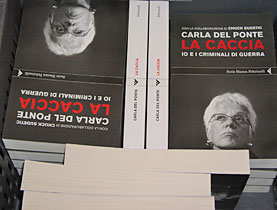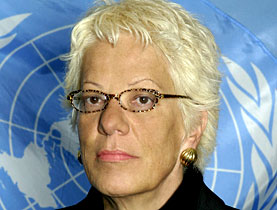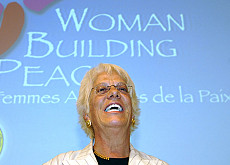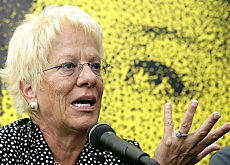Del Ponte war crimes book stirs up a storm

A book by Switzerland's ambassador to Argentina, Carla Del Ponte, on her time prosecuting war criminals has caused controversy both in Switzerland and abroad.
The former chief prosecutor of the International Criminal Tribunal for the former Yugoslavia in The Hague has been told by the Swiss government that she cannot promote the work, which deals with several Balkan leaders.
“The Hunt: Me and War Criminals” has been published in Switzerland and Italy. The foreign ministry confirmed earlier this week that it had asked Del Ponte to return to Buenos Aires before a scheduled presentation of the book in Milan on Sunday.
It said there were statements in the work, written with New York Times reporter Chuck Sudetic, that were incompatible with Del Ponte’s status as an official government representative.
The 412-page book details almost eight years of work at the tribunal before Del Ponte stepped down last year.
Italian newspaper La Repubblica reported in March that the Belgrade government had tried to block its publication.
Message
“The message that I wanted to get across in this book is a great faith in international justice,” Del Ponte told swissinfo. She was speaking in Lugano, Italian-speaking Switzerland, a few days before the foreign ministry imposed its veto.
“It is possible to obtain justice for the thousands of victims of these criminals even given all the difficulties which obstruct the path to justice. I’m addressing above all young people so that in one way or another they take action,” she said.
Responding to the news that the International War Crimes Tribunal has acquitted former commander of the Kosovo Liberation Army Ramush Haradinaj of war crimes,
Del Ponte was measured. “International justice has its limits, of course, just as national and local justice does,” she replied.
“We know all too well that there are many difficulties, but the way embarked upon is the right one.”
The ban on Del Ponte talking about her book meant that she was not able to attend a scheduled book promotion event in Lugano on Tuesday morning.
This caused consternation, with people calling the move a “disgrace”. Others praised her as a “courageous woman”.
Uncomfortable reading?
In interviews released before the book’s publication, Del Ponte said it was simply meant to be an account of her time at the international tribunal.
In fact, it makes uncomfortable reading for Belgrade because it refers to the failure to bring in the fugitive Bosnian Serb leader Radovan Karadzic and army chief Ratko Mladic.
In the pages dedicated to Kosovo she also writes of the current Prime Minister Hashim Thaçi.
Thaçi was formerly political leader of the Kosovo Liberation Army (KLA), the guerrilla group that fought against Serb forces in the late 1990s.
Del Ponte recalls in the book how he provoked her during roundtable negotiations.
“I looked him in the eyes and I told him that I had started investigations into crimes committed by Kosovo Albanians. I never spoke about an indictment against him, but of course Thaçi came to this conclusion because he became stony faced,” she writes.
The book has also caused an outcry within Switzerland. Several politicians have called for her to resign from her ambassador’s post.
Switzerland’s relations with the Balkans have been mixed this year. The country was among the first countries to recognise Kosovo’s independence, a move that immediately led to Serbia recalling its ambassador to Bern.
swissinfo, based on an Italian article by Françoise Gehring in Lugano
Carla Del Ponte was born in 1947 in Bignasco, in the southern Swiss canton of Ticino.
She studied international law in Bern, Geneva and Britain.
In 1981 she became Ticino’s chief prosecutor, where she became well known for her fight against money laundering, organised crime and gun running.
Del Ponte was Swiss federal prosecutor from 1994-9, to a mixed reception, with some accusing her of “activism”.
In 1999 the then UN Secretary-General Kofi Annan appointed her chief prosecutor at the International Criminal Tribunal for the Former Yugoslavia. She left this post at the end of 2007.
In January she took up her new job as Swiss ambassador to Argentina.
The ICTY was established by Resolution 827 of the UN Security Council in May 1993.
Based in The Hague, it is the first international body for the prosecution of war crimes since the Nuremberg and Tokyo trials held after the Second World War.
The tribunal has jurisdiction over individuals responsible for genocide, war crimes and crimes against humanity in the territory of former Yugoslavia after January 1, 1991.

In compliance with the JTI standards
More: SWI swissinfo.ch certified by the Journalism Trust Initiative



You can find an overview of ongoing debates with our journalists here. Please join us!
If you want to start a conversation about a topic raised in this article or want to report factual errors, email us at english@swissinfo.ch.